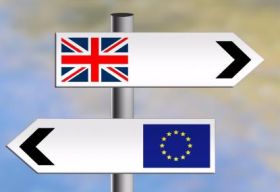Analytics, Economics, EU – Baltic States, Financial Services, Investments, Legislation
International Internet Magazine. Baltic States news & analytics
Wednesday, 17.12.2025, 07:11
Eesti Pank: UK decision probably won't lead to economic decline
 Print version
Print version |
|---|
It's extremely deplorable that Brits decided to leave the EU, the central bank's Vice President Ulo Kaasik told BNS on June 24th. "In our opinion it is definitely bad both for the United Kingdom and all other members of the European Union."
Kaasik said that while nothing will change immediately, there's a lot of uncertainty for businesses.
"How you should see your future and how you should build up your future. On the one hand there's a lot of uncertainty on the financial markets, on the other hand there's a significant amount of uncertainty when it comes to the investment decisions of businesses, since it is not clear what the economic relations between the United Kingdom and the European Union will be like."
Where in the short term the UK's leaving may bring with it a decline of the markets, it shouldn't lead to an economic decline, Kaasik said. "But of course it is difficult to predict what the developments will be."
Rather, problems can be seen in the longer term, Kaasik said. He said that integrated markets have a stronger growth potential and are able to function more effectively. When separated, markets definitely have a weaker growth potential.
Kaasik said there will probably be no immediate setbacks for the real economy, but if uncertainty is to remain very high for a longer period of time it may have a short-term negative effect and may cut economic growth in the short term.
The UK's leaving should not have a negative effect on the financial systems of the EU. In addition, the central banks are keeping an eye on the situation and are ready to step in and provide liquidity should the need arise, Kaasik said. The UK meanwhile is in a more difficult position, especially considering the size of its financial sector compared to the rest of the economy, the Bank of Estonia vice governor said.
Asked if London could lose the status of financial center of Europe, Kaasik was unable to say. He said that whether or not the financial center will relocate depends on the agreement to be forged between the EU and the UK.
"It is clear that should the relationship become very distant, it may prove difficult to provide some services to the European market from London. Yet some services may be moving not to Europe at all. There are many financial centers in the world."
Estonia does not stand to be affected much directly as a result of Brexit, whereas the indirect impact via trading partners may be more significant. At the same time, various surveys indicate that the negative economic impact on the UK itself is bigger than on the EU, Kaasik said.
The UK’s decision to leave the EU will negatively affect the economic growth of the UK and the EU, said Bank of Latvia economist Ieva Skrivere.
She said that a referendum may cause a number of internal policy problems in the UK. Even though the majority of people voiced a wish to leave the EU, the vote was close, and those 48 percent who supported EU membership can voice their disapproval of the outcome.
Skrivere said that there are at least four possible scenarios for the exit procedure, and negotiations on them will start only now.
Skrivere said that one of the possibilities is the Norwegian, Icelandic scenario when the UK joins the European Economic Area which would ensure access to the common market, but the UK will have to follow all market regulations, which has been one of the main reasons causing the referendum. It would mean that the UK would end up in the same position as before the referendum, but would not have rights to influence decisions.
The Swiss scenario provides that the UK might sign a bilateral agreement with the EU. However, this allows for a free immigrant flow and payments into the EU budget. Both these issues were important for the UK.
The Canadian scenario provides for a free trade agreement. Several Brexit supporters named this as the most appropriate scenario as there would be access to the common EU market, but the government does not have to make payments into the EU budget. Still, some sectors, for example, agriculture, would see additional tariffs and services sector would be opened partly.
If no other agreement or the free trade agreement is not achieved, in two years automatically regulations of the World Trade Organizations would apply. In such a case, the UK would be able to restrict migration, but would lose access to the EU common market.
The Bank of Latvia economist said that irrespective of the chosen scenario, the stock market and British currency value would see considerable fluctuations in the nearest time. In a long term such uncertainty will reduce investments and export growth and will negatively influence the economic growth of the UK and the EU.
She said that that the other EU member states should continue work on strengthening the EU and its institutions, improve the EU common market, explain the common decisions and processes to the society to reduce deceptive impressions and ungrounded euroskepticism.








 «The Baltic Course» Is Sold and Stays in Business!
«The Baltic Course» Is Sold and Stays in Business!

